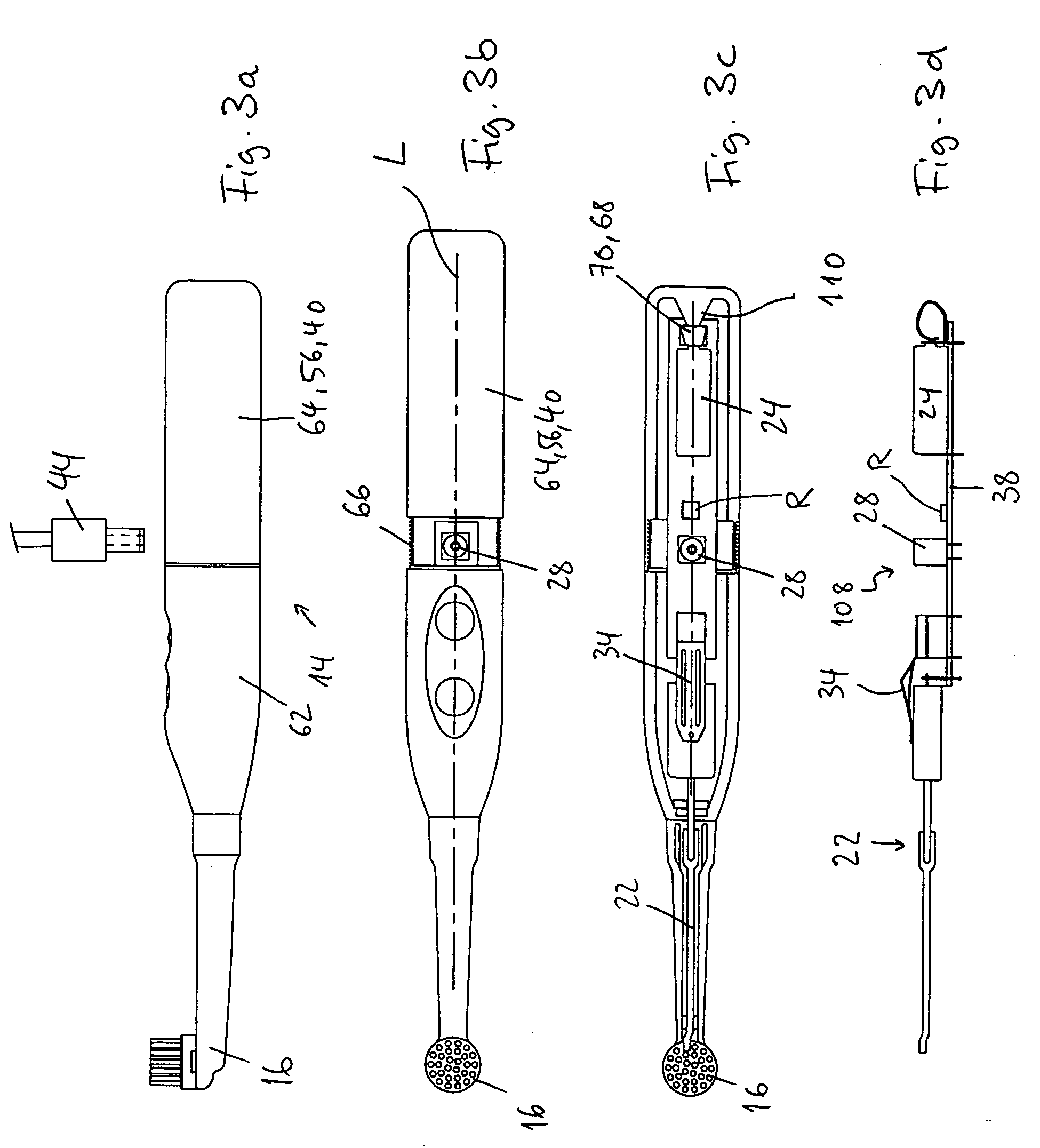Toothbrush and process for producing the same
a technology for teeth and brushes, applied in the field of teeth brushes, can solve the problems of not being able to penetrate water or other foreign matter during the intended use of teeth brushing, and achieve the effect of reliable operation and cost-effectiveness
- Summary
- Abstract
- Description
- Claims
- Application Information
AI Technical Summary
Benefits of technology
Problems solved by technology
Method used
Image
Examples
case 1
[0111] Case 1: the contact element 28, together with the energy store 24, is located in the inner space 36, which is closed off with sealing action by a closure 40 (FIGS. 1 and 3-5). During normal operation (FIG. 12a), the primary sealing element (closure 40) closes off the inner space 36 in a water-tight manner. A switch 70, which is actuated by placing the closure 40 in position / removing the closure 40, is closed. The user can switch the consumer 22 on and off by a further switch 34. If the closure 40 is removed, the switch 70 inevitably switches off the connection between the storage battery 24 and the consumer 22 (FIG. 12b). In the open, i.e. non-sealed state, it is thus no longer possible for the electric toothbrush to be switched on. During charging of the storage battery 24 by virtue of the plug 44 being plugged into the socket 28, the inner space 36 is open (FIG. 12c). By providing the switch 70, it is then additionally possible to achieve the situation where charging of the...
case 2 (figs.12d-e) : the inner space 36 is completely sealed in relation to the contact element 28 in each operating state (figs.7-10).since the primary seal is not removed , a distinction is only made between two operating states , to be precise , the normal operating state (fig.12d) and the charging state (fig.12e).the operation of opening or closing the secondary seal need not , in fact , have any influence on the charging circuit.for the purpose of charging the storage battery 24 , the socket 28 preferably has an integrated switch 70 which performs the task of the switch 70 actuated by the closure in case 1.this integrated switch 70 guarantees that the storage battery 24 can be charged irrespective of the switching state of the switch 34.the integrated switch 70 is opened when the plug 44 is plugged in (fig.12e)
[0112] Case 2 (FIGS. 12d-e): the inner space 36 is completely sealed in relation to the contact element 28 in each operating state (FIGS. 7-10). Since the primary seal is not removed, a distinction is only made between two operating states, to be precise, the normal operating state (FIG. 12d) and the charging state (FIG. 12e). The operation of opening or closing the secondary seal need not, in fact, have any influence on the charging circuit. For the purpose of charging the storage battery 24, the socket 28 preferably has an integrated switch 70 which performs the task of the switch 70 actuated by the closure in case 1. This integrated switch 70 guarantees that the storage battery 24 can be charged irrespective of the switching state of the switch 34. The integrated switch 70 is opened when the plug 44 is plugged in (FIG. 12e), and thus prevents the situation where a completely empty storage battery 24 cannot be charged because the consumer 22 is connected to the storage battery 24 ...
case 3 (figs.12f-h)
[0114] Case 3 (FIGS. 12f-h): in a manner analogous to case 1, a distinction is made here, once again, between three operating states. The switch 70 corresponds to the spring element 72 shown in FIG. 6, and the switch 70′, as in case 2, is preferably integrated in the contact element 28.
[0115]FIG. 12f describes the normal operating state. The user switches the consumer 22 on and off via the switch 34. The switches 70 (actuated by the closure) and 70′ (integrated in the contact element 28) are closed. The resistor R is short-circuited by the closed switch 70.
[0116]FIG. 12g describes the state in which the closure has been removed and the consumer, irrespective of the state of the switch 34, on account of the risk of contamination, is not to function. In this operating state, it is indeed the case that the consumer 22 is in electrical connection with the storage battery 24 via the resistor R, but it will nevertheless not be possible to switch it on, since the resistance of the resisto...
PUM
 Login to View More
Login to View More Abstract
Description
Claims
Application Information
 Login to View More
Login to View More - R&D
- Intellectual Property
- Life Sciences
- Materials
- Tech Scout
- Unparalleled Data Quality
- Higher Quality Content
- 60% Fewer Hallucinations
Browse by: Latest US Patents, China's latest patents, Technical Efficacy Thesaurus, Application Domain, Technology Topic, Popular Technical Reports.
© 2025 PatSnap. All rights reserved.Legal|Privacy policy|Modern Slavery Act Transparency Statement|Sitemap|About US| Contact US: help@patsnap.com



